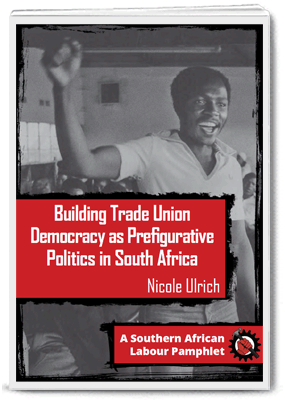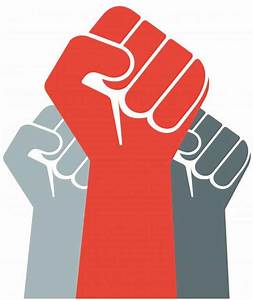 The question of state government elections and running a workers or socialist political party continues to be raised in the working-class movement and the Left globally. As we may know, there was excitement about the rise of Jeremy Corbyn in the Labour Party in Britain, about the successes of left political parties in certain parts of Europe and Latin America and, more recently, certain shifts to more centrist positions in the United States amongst a section of the Democratic Party calling themselves “Democratic Socialists.” In South Africa, many workers and some activists seem cautiously optimistic about NUMSA’s formation of the Socialist Revolutionary Workers Party that participated in the 2019 general elections, but did not manage to get a seat in Parliament.
The question of state government elections and running a workers or socialist political party continues to be raised in the working-class movement and the Left globally. As we may know, there was excitement about the rise of Jeremy Corbyn in the Labour Party in Britain, about the successes of left political parties in certain parts of Europe and Latin America and, more recently, certain shifts to more centrist positions in the United States amongst a section of the Democratic Party calling themselves “Democratic Socialists.” In South Africa, many workers and some activists seem cautiously optimistic about NUMSA’s formation of the Socialist Revolutionary Workers Party that participated in the 2019 general elections, but did not manage to get a seat in Parliament.
With this in mind, we need to look at issues of social transformation within the framework of what we want to achieve and the relationship between the means and ends of struggle in pursuit of these aims. The historic and ultimate socialist end is a society characterised by collective democratic control of the political and economic systems and one without class divisions and oppression of any kind – in real terms, a society without the state and capitalism in particular.
If this is so, is this revolutionary transformation possible by means of state power and political parties that aim to capture this form of power?
Download PDF here
 In examining the possibilities for politics within and at a distance from the state, it is important to revisit the democratic traditions of the working class, which are often learned through struggles and strikes – and which were exemplified by the new unions of the 1970s and 1980s. Not much of this alternative tradition of democracy outside the state has been captured in official histories, which present the attainment of democracy in terms of the formation of a parliamentary government in 1994.
In examining the possibilities for politics within and at a distance from the state, it is important to revisit the democratic traditions of the working class, which are often learned through struggles and strikes – and which were exemplified by the new unions of the 1970s and 1980s. Not much of this alternative tradition of democracy outside the state has been captured in official histories, which present the attainment of democracy in terms of the formation of a parliamentary government in 1994. In the midst of the COVID-19 pandemic, it often seems as if we are stuck in a dystopian movie. In this movie death is stalking us, hospitals overflow with the sick and dying, and the grave diggers are at work. We know more victims will soon die as the folly of millions of workers being forced by circumstances to return into cramped mines, banks, factories and warehouses is so evident. Those that are no longer needed by the billionaires who own the companies are marshalled daily by the police and military dishing out violence and on occasion, humiliation, to underline their power and the power of their bosses.
In the midst of the COVID-19 pandemic, it often seems as if we are stuck in a dystopian movie. In this movie death is stalking us, hospitals overflow with the sick and dying, and the grave diggers are at work. We know more victims will soon die as the folly of millions of workers being forced by circumstances to return into cramped mines, banks, factories and warehouses is so evident. Those that are no longer needed by the billionaires who own the companies are marshalled daily by the police and military dishing out violence and on occasion, humiliation, to underline their power and the power of their bosses. Twenty-five years into democracy the black working class majority in South Africa has not experienced any meaningful improvements in its conditions. The apartheid legacy of unequal education, healthcare and housing and the super-exploitation of black workers continues under the ANC and is perpetuated by the neoliberal policies it has imposed.
Twenty-five years into democracy the black working class majority in South Africa has not experienced any meaningful improvements in its conditions. The apartheid legacy of unequal education, healthcare and housing and the super-exploitation of black workers continues under the ANC and is perpetuated by the neoliberal policies it has imposed. The question of state government elections and running a Workers or Socialist political party continues to be raised in the working class movement and the Left globally. As we may know, there was excitement about the rise of Jeremy Corbyn in the Labour Party in Britain, left political parties in certain parts of Europe and Latin America and, more recently, certain shifts to more centrist positions in the United States amongst a section of the Democratic Party calling themselves “Democratic Socialists”. In South Africa, many workers and some activists seem cautiously optimistic by NUMSA’s formation of the Socialist Revolutionary Workers Party that will seek to participate in the 2019 general elections.
The question of state government elections and running a Workers or Socialist political party continues to be raised in the working class movement and the Left globally. As we may know, there was excitement about the rise of Jeremy Corbyn in the Labour Party in Britain, left political parties in certain parts of Europe and Latin America and, more recently, certain shifts to more centrist positions in the United States amongst a section of the Democratic Party calling themselves “Democratic Socialists”. In South Africa, many workers and some activists seem cautiously optimistic by NUMSA’s formation of the Socialist Revolutionary Workers Party that will seek to participate in the 2019 general elections. Before there was the Congress of South African Trade Unions, today’s COSATU, there was FOSATU. FOSATU was set up in 1979. There had been strikes and struggles in the 1970s, starting with a big strike wave in Namibia from 1971-1972, which was then a South African colony, then a big strike wave starting in Durban 1973, which spread around the country. Although we remember 1976 for the bravery of the youth and students, we must remember that the 1976 uprising also involved general strikes by the black working class, mass stay-aways.
Before there was the Congress of South African Trade Unions, today’s COSATU, there was FOSATU. FOSATU was set up in 1979. There had been strikes and struggles in the 1970s, starting with a big strike wave in Namibia from 1971-1972, which was then a South African colony, then a big strike wave starting in Durban 1973, which spread around the country. Although we remember 1976 for the bravery of the youth and students, we must remember that the 1976 uprising also involved general strikes by the black working class, mass stay-aways.


